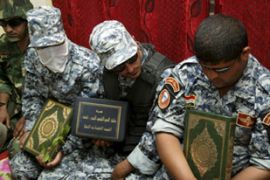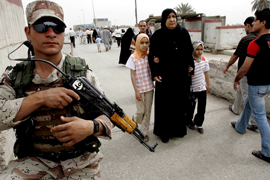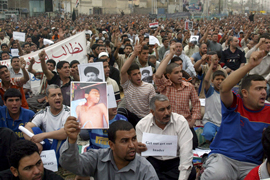Iraq sacks ‘disloyal’ troops
Government also announces crackdown on armed groups selling petrol.

Published On 14 Apr 2008
“Those people did not do their duties in Basra and Kut. There were many complaints against them. They were part of these operations, but they did not perform the duties they were supposed to,” Major-General Abdel Karim Khalaf, an interior ministry spokesman, said.
 |
| US and Iraqi troops have moved in on militias in Sadr City [EPA] |
About 700 people were killed in the fighting before al-Sadr ordered his men to leave the streets on March 30 in return for an agreement by the government to halt raids.
Fighting resumed on April 6 in Sadr City, a poverty stricken part of the capital showing strong support for the al- Mahdi Army.
Iraqi and US forces moved tanks and armoured vehicles on to the streets and began taking on the militias.
About 90 people have died in Sadr City and other Baghdad Shia enclaves since.
Despite a lull in the fighting on Sunday, Ali al-Dabbagh, a government spokesman, said “we will continue until we secure Sadr City”.
“We will not give up until the people of Sadr City have a normal life.”
Militia-run stations
The crackdown on armed groups’ control of oil resources comes weeks after an unsuccessful clampdown on Shia militias in Basra sparked deadly clashes in several cities.
It is believed that petrol stations are covertly controlled by Shia militia dominated by the al-Mahdi Army.
Nuri al-Maliki, the prime minister, gave instructions to ban the interference or presence of any unofficial people at state-run and private petrol stations, refineries and oil distribution centres in the statement.
 |
| Shia protest against the US and Iraqi government troops after Friday prayers [EPA] |
“Anyone who interferes in the supply, pricing and working hours mechanisms or who charges money will be subjected to the law,” a government statement read.
Stations in eastern Baghdad and some southern provinces are particularly at risk.
The groups make large sums of money by selling smuggled gas and kerosene on the black market.
Petrol costs about $1.50 a gallon at petrol stations and about $2.53 on the black market – usually vendors peddling it from jerrycans on the side of the road so that motorists can avoid long waits and shortages.
Kerosene is sold for 50 US cents a gallon through official channels and $3.37 on the black market.
Strategic interests
Meanwhile, al-Maliki is to travel to the Belgian capital, Brussels, to meet Jose Manuel Barrosso, European Commission president, Javier Solana, the commission’s foreign policy chief, and members of the European parliament to discuss security and trade.
His delegation, which includes oil and political leaders, will also hold talks with Jaap de Hoop Scheffer, the Nato secretary-general.
Al-Dabbagh, the government spokesman, said al-Maliki would “focus on economic, military and security matters and also talk about Iraq-EU cooperation in the energy field, especially as regards liquefied petroleum gas”.
“Iraq has large stores of gas and European countries are urgently in need of this gas. The prime minister will talk about co-operation and trade agreements between European countries and Iraq, and prepare Iraq to become a full partner for the European Union.”
Source: News Agencies